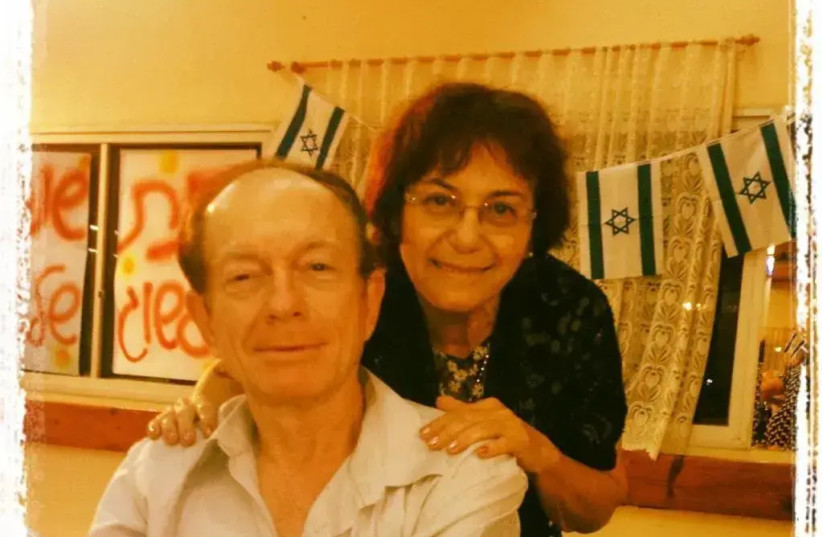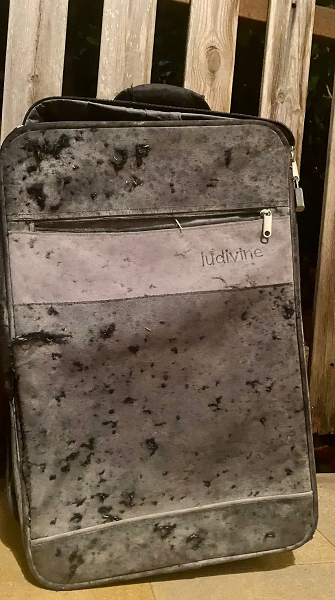In the midst of countless battles against Hamas, Menuha Chulati would often refuse to leave the top floor of their home in Kibbutz Kissufim, even during missile attacks.
But this time, as terrorists infiltrated the surrounding settlements, Menuha and her husband Israel were caught in the crossfire.
Menuha did not survive the inferno
"Her last message to me was 'summarizing 76,'" says their daughter Einat Hulati Efron. "I responded, 'why not 96?' and she laughed." But Menuha did not survive the inferno, leaving Israel to witness the horrific sight of her body being set ablaze by Hamas terrorists.
Israel and Menuha had been living in separate houses in Kibbutz Kissufim for the past few years. Menuha had initially come to the kibbutz as a soldier-teacher and later settled there with her family.
"They quickly realized they were under attack," Einat tells Walla. "It caught them by surprise, and my father debated whether to step outside. I managed to speak to my mother when she was at the hospital. My father had described the previous evening as one of the best days of her life. I messaged her about the situation, and she responded with a sticker that said 'oy vey zmir! [Yiddish for "oh, woe is me!"]' They didn't fully grasp the gravity of the situation."

However, as communication, electricity, and cell phone reception were cut off in Kissufim, Einat's messages did not reach her parents.
How long could rescue take?
"We were told that a rescue mission had begun. They didn't mention any fighting, just the rescue, so we thought it was all over. How long could a rescue take?"
Einat's father returned home but rested, while she sent her husband to Urim as they were being evacuated. She warned her father not to go out alone, and though he hesitated, he ultimately decided to stay inside after hearing gunshots.
In the neighboring house, where Menuha was, there was no response.
"The first rescue included older women and their Filipino caregivers, but not her. We thought maybe she hadn't heard or was waiting for my father, or perhaps she refused to evacuate," Einat recounts. "A neighbor who arrived in Urim informed us that my mother was no longer alive, but there was no official confirmation at that point."
Einat soon received news that houses in Kissufim were on fire.
"They began the rescue operation as fires broke out. The two adjacent apartments were successfully evacuated, but my mother and her family were not saved and perished in the flames," she reveals. "Meanwhile, my father spent over 24 hours in a protected area. He could hear terrorists speaking Arabic in the neighbor's house."

After agonizing hours, Einat finally received a message from her father.
"I realized that it was all over. How could they rescue everyone except him?" she wonders. "Suddenly, a messenger arrived. He had probably searched the house, and in my hysteria, I messaged him: 'Are you alive?' There was no response.
"It turned out that he had heard soldiers and escaped through the back door to signal them. They started spraying his house with fire extinguishers. He re-entered the safe room and eventually made his way out through a window with a soldier's assistance."
Israel was desperate to know what happened to Menuha and eventually learned the heartbreaking truth that she had been burned alive.
"He had a suitcase filled with his and his wife's medications. The suitcase was riddled with bullet holes," Einat reveals in a tearful testimony. "He insisted on finding his wife. They tried to dissuade him, but he began walking and eventually found her. What he saw... it's better left unsaid. They yelled at him that everything was collapsing and they needed to evacuate.
Then, a soldier apologetically informed him, "I didn't want to be the one to tell you" (when he encountered Menuha's lifeless body). That's when I received a phone call from him. He himself couldn't fully comprehend it. He had returned from the brink of death.
He told me, "They're taking me out, but I wanted to tell you that I'm going out alone."
The Jerusalem Post and OneFamily are working together to help support the victims of the Hamas massacre and the soldiers of Israel who have been drafted to ensure that it never happens again.
Become a partner in this project by donating to OneFamily >>
